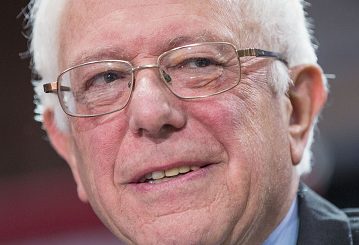Bernard "Bernie" Sanders (born September 8, 1941) is an American politician who has served as the junior United States Senatorfrom Vermont since 2007. Sanders has been a Democrat since 2015, and was previously the longest-serving independent in U.S. congressional history. He has always caucused with the Democrats, which has entitled him to committee assignments and at times given Democrats a majority. Sanders became the ranking minority member on the Senate Budget Committee in January 2015; he had previously served for two years as chair of the Senate Veterans' Affairs Committee. A self-described democratic socialist, Sanders is pro-labor and emphasizes reversing economic inequality.[2][3] Many scholars consider his views to be more in line withsocial democracy and New Deal-style American progressivism than democratic socialism.[4][5]
Sanders was born and raised in the Brooklyn borough of New York and graduated from the University of Chicago in 1964. While a student he was an active civil rights protest organizer for the Congress of Racial Equality and the Student Nonviolent Coordinating Committee. After settling in Vermont in 1968, Sanders ran unsuccessful third-party campaigns for governor and U.S. senator in the early to mid-1970s. As an independent, he was elected mayor of Burlington—Vermont's most populous city—in 1981, where he was reelected three times. In 1990 he was elected to represent Vermont's at-large congressional district in the U.S. House of Representatives. In 1991 Sanders co-founded the Congressional Progressive Caucus. He served as a congressman for 16 years before being elected to the U.S. Senate in 2006. In 2012, he was reelected with 71% of the popular vote.
Sanders rose to national prominence following his 2010 filibuster against the Middle Class Tax Relief Act of 2010. He favors policies similar to those of social democratic parties in Europe, particularly those instituted by the Nordic countries, and has built a reputation as a leading progressive voice on issues such as campaign finance reform, corporate welfare, global warming, income inequality, LGBT rights, parental leave, and universal healthcare. Sanders has long been critical of U.S. foreign policy and was an early and outspoken opponent of the Iraq War. He is also outspoken on civil liberties and civil rights, particularly criticizing racial discrimination in the criminal justice system as well as advocating for privacy rights against mass surveillance policies such as theUSA PATRIOT Act and the NSA surveillance programs.
After announcing his campaign for the Democratic presidential nomination on April 30, 2015, he won 23 state primary contests in the 2016 election. While his campaign remains active, Hillary Clinton has become the presumptive Democratic nominee.



